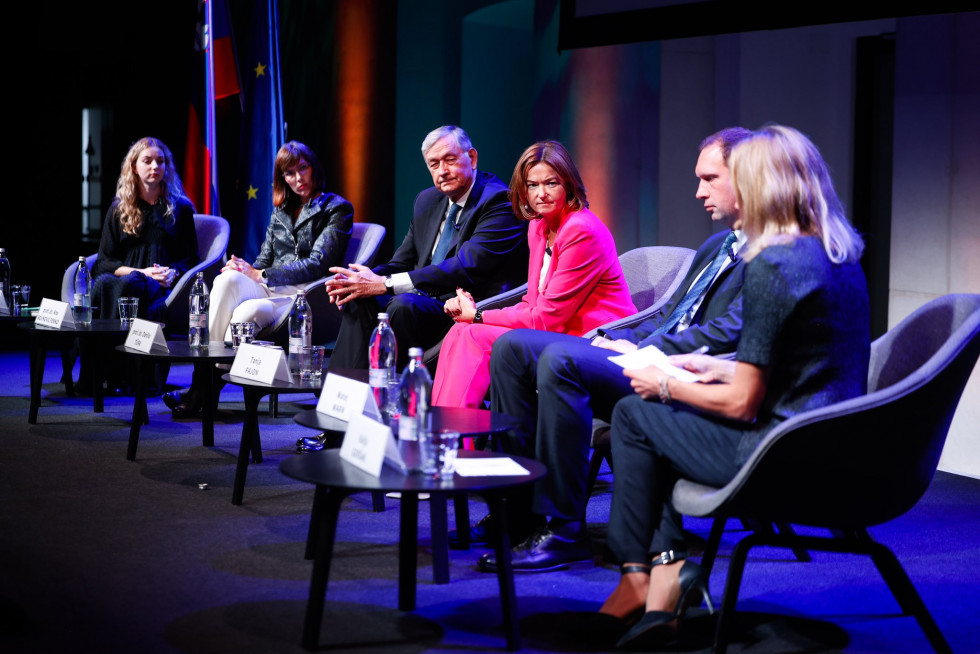Round Table "153" on Slovenia's path to the UN Security Council

Round Table "153" on Slovenia's path to the UN Security Council | Author STA, Anže Malovrh
For Slovenia's foreign policy, the election as a non-permanent member of the Security Council marks a historic milestone. Under the slogan "Building Trust – Protecting the Future", Slovenia managed to convince 153 countries that it is and will remain a trustworthy partner.
In addition to Tanja Fajon, Minister of Foreign and European Affairs, the panellists of the round table included Prof. Danilo Türk, former President of the Republic of Slovenia, the first Slovenian Ambassador to the UN in New York and the Slovenian representative to the Security Council, Prof. Ana Bojinović Fenko, Lecturer in International Relations at the Faculty of Social Sciences of Ljubljana, Matej Marn, Head of the UN Security Council Task Force at the Ministry of Foreign and European Affairs, and Arina Šmidt, Youth Delegate to the UN.
By way of introduction, Minister Tanja Fajon stressed that Slovenia's candidacy for the UN Security Council was an important foreign policy and country-wide project. "Through a non-aggressive and respectful campaign coupled with personal contacts and presence in parts of the world where we had not been so visible in the past, we have managed to convince countries that Slovenia is a trustworthy country." She added: "Right after Slovenia became an observer state on the Security Council at the beginning of October, major challenges began. In recent days, I have been constantly in touch with our partners and the Permanent Mission in New York because of the situation in Israel." She concluded by stressing, "I am aware of the weight of our words and the responsibility we have towards our partners around the world. Slovenia will have to be confident and consistent even in difficult times and stand up for what we believe is right. I hope our country will live up to the expectations of all those who gave us their support."
Ambassador Samuel Žbogar, Slovenia's representative on the Security Council, addressed the participants on-line and briefly outlined the work of the Permanent Representation, which is divided into five thematic areas that allow addressing key challenges. He stressed that "Slovenia does not want to be a silent observer, but an active member of the Security Council and the international community."
The first Slovenian Ambassador to the UN and former President of Slovenia, Prof. Danilo Türk, underscored that the world is changing and that as a member of the Security Council Slovenia needs to stand on its own feet and make a substantial contribution to the debates. "Let’s not forget that the Security Council allows for constant contacts with other Member States. This was stressed during the campaign. Now it is time to demonstrate this quality in practice."
Matej Marn, Head of the UN Security Council Task Force, said that Slovenia's senior representatives had met with almost all countries. "The common denominator of all the talks was climate change. Slovenia tried to find common ground with all countries. We focused on women's empowerment, effectiveness of peacekeeping operations, mine action, protection of civilians and conflict prevention, among others."
Prof. Ana Bojinović Fenko expressed her satisfaction over the fact that Slovenia positioned itself among the small countries that feel they have a responsibility to contribute to the international community: "This contribution, if it is sincere, should not be negligible."
Arina Šmidt, Youth Delegate to the UN, focused on the role of young people as an indispensable link to peace and security: "Young people are a vital part of the communities and are usually the first affected by conflict, which prevents them from normal development and limits their access to education and health care."

